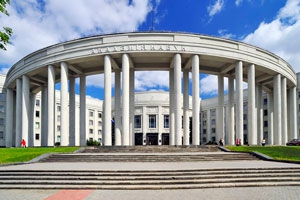Ru
|
Eng
Belarus’ Academy of Sciences busy working on four new Union State programs
19.08.2015

MINSK, 18 August (BelTA) – The National Academy of Sciences of Belarus (NASB) is preparing concepts of four new Union State programs, BelTA learned from Piotr Vityaz, NASB Chief of Staff, during a video briefing held on 18 August to highlight the implementation of programs of the Union State of Belarus and Russia.
Piotr Vityaz said: “At present we have a number of projects in the form of concepts for Union State programs. There are four of them now. Those concepts envisage the standardization of space research and the continuation of the transgenic animals program. We are also working on programs relating to milk and fodder production for animals. We have a lot of ideas.”
“A joint session of the Belarusian-Russian commission took place in Moscow a short while ago. Representatives of the State Science and Technology Committee and we were present as customers. We discussed what had been done already and approved rather a long list of programs, which are slated for implementation in the near future, about 20 of them,” noted the official.
BelRosLakt is the codename for one of the four concepts of the new Union State programs. As part of the program lactoferrin will be used to make food. It will be kind of a continuation of the programs BelRosTransgen and BelRosTransgen 2. “The development of medications involving lactoferrin needs a lot of time not only for research but also for clinical trials, this is why it is virtually impossible to do everything within three years. We suggested the BelRosLakt program. During the first stage we are going to develop drugs while simultaneously creating food that humans can use. Those will be stimulators and food for children and adults,” explained the Chief of Staff of the National Academy of Sciences of Belarus.
Belarusian-Russian research efforts to make medications based on lactoferrin began in 2003 when the first Union State program BelRosTransgen was launched. The second BelRosTransgen program began in 2009. The researchers managed to raise a herd of gengineered goats, which milk contain lactoferrin.
Piotr Vityaz said: “At present we have a number of projects in the form of concepts for Union State programs. There are four of them now. Those concepts envisage the standardization of space research and the continuation of the transgenic animals program. We are also working on programs relating to milk and fodder production for animals. We have a lot of ideas.”
“A joint session of the Belarusian-Russian commission took place in Moscow a short while ago. Representatives of the State Science and Technology Committee and we were present as customers. We discussed what had been done already and approved rather a long list of programs, which are slated for implementation in the near future, about 20 of them,” noted the official.
BelRosLakt is the codename for one of the four concepts of the new Union State programs. As part of the program lactoferrin will be used to make food. It will be kind of a continuation of the programs BelRosTransgen and BelRosTransgen 2. “The development of medications involving lactoferrin needs a lot of time not only for research but also for clinical trials, this is why it is virtually impossible to do everything within three years. We suggested the BelRosLakt program. During the first stage we are going to develop drugs while simultaneously creating food that humans can use. Those will be stimulators and food for children and adults,” explained the Chief of Staff of the National Academy of Sciences of Belarus.
Belarusian-Russian research efforts to make medications based on lactoferrin began in 2003 when the first Union State program BelRosTransgen was launched. The second BelRosTransgen program began in 2009. The researchers managed to raise a herd of gengineered goats, which milk contain lactoferrin.
SCIENCE. TECHNOLOGY. INNOVATIONS
13.08.2024
28.06.2024
28.06.2024
25.06.2024
05.06.2024
15.05.2024
15.05.2024
26.04.2024
26.04.2024
26.04.2024













